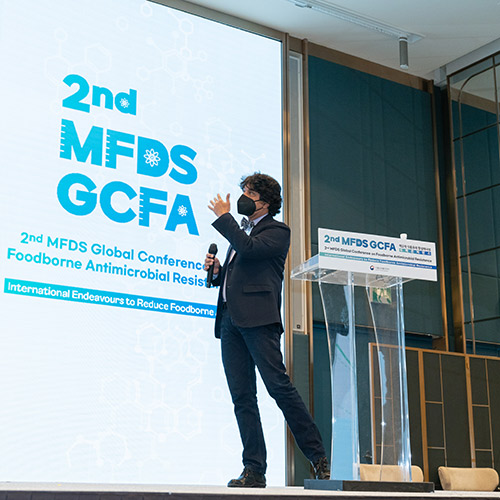
Professor of economics and business economics publishes research summary on economic impacts of foodborne antimicrobial resistance

Amyaz Moledina, professor of economics and business economics at The College of Wooster, recently co-authored a research summary for policymakers that was published by the Food and Agriculture Organization (FAO) of the United Nations. The publication, “Foodborne Antimicrobial Resistance (AMR): An Economic Concern,” highlights the socioeconomic costs of antimicrobial use in food production.
Moledina co-authored the summary with Diletta Topazio, a behavioral economist at FAO, and Jeffrey LeJeune, food safety and quality officer at FAO, while spending part of his 2022–23 research sabbatical with the organization’s Food Systems and Food Safety Division. The publication also was featured in Food Safety Magazine in the article “FAO Calls for ‘Bold Action Today’ to Mitigate Foodborne AMR, Highlights Economic Burden and Possible Courses of Action.”
“Antimicrobials, which include antibiotics, antiviral drugs, and fungicides, have the ability to cure disease in humans, plants, and animals, but as we use these medicines, the microbes that are supposed to be killed instead mutate and grow resistant,” Moledina explained. “The social cost of this resistance is felt by all. As these microbes become resistant, diseases will be harder to cure, and people, plants, and animals will get sicker and die.”
The authors refer to this resistance (AMR) as a “tragedy of the commons.” Economists have used this concept to describe how common, or shared, resources can be overused, ultimately depleting or destroying their value. When cows overgraze on a common pasture, for example, the land becomes barren. What was once a valuable resource for everyone becomes an unusable resource for anyone. In the case of AMR, the shared resource—antimicrobials—become increasingly ineffective at treating infections to the detriment of society as a whole. This is not only a public health issue, but also an economic one as individuals get and remain sick, resulting in productivity losses and premature deaths.
“By characterizing AMR as a global tragedy of the commons, as we have done here, we show policymakers and researchers that it is connected to actual and predicted losses in GDP growth,” Moledina said. “By some estimates, the risks associated with AMR are on par with the problem of climate change.”
The food system is a large contributor to AMR. For example, when antibiotics are fed to chickens to promote their growth or fungicides are used on fruits and vegetables to extend their shelf life, microbes can begin to build up resistance to them, decreasing the effectiveness of the drug. In addition, humans may consume antimicrobial residue from the contaminated food.
In addition to his time with the FAO, Moledina completed a behavioral economics experiment he had begun with Wooster Associate Professor of Economics Philip Mellizo on consumer willingness to pay for food safety in low- and middle-income countries during his sabbatical. He presented this research at the Korean Ministry of Food and Drug Safety’s Global Conference on Foodborne Antimicrobial Resistance in September 2022. He hopes to continue his research in this area and publish future results.
“We want policymakers to read this publication because we need them to recognize that there is an economic imperative to do something about AMR,” Moledina said. “In this post-pandemic moment, we have to think about public health from a global perspective. AMR is everybody’s problem that knows no borders. It effects our entire ecological system. We have to collectively steward the disease-fighting power of antimicrobials. There’s an urgency to this because if you get sick and take an antibiotic, and it doesn’t work, you can’t go to work or you may die from the disease. Antimicrobials are a gift. We have to work together to preserve the effectiveness of this resource.”
Posted in Faculty, News on August 28, 2023.
Related Posts
Related Areas of Study
Economics
Learn how humans organize to sustain life and enhance its quality from a diversity of economic perspectives
Major MinorBusiness Economics
Learn how economics and quantitative methods can be applied to contemporary problems in finance, management, and business with expert faculty mentors in a diverse department
Major

